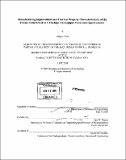Manufacturing improvement and thermal property characterization of the frame structure of an Ultra-high Throughput Mutational Spectrometer
Author(s)
Lin, Jiengju J. (Jiengju James)
DownloadFull printable version (2.477Mb)
Other Contributors
Massachusetts Institute of Technology. Dept. of Mechanical Engineering.
Advisor
Ian W. Hunter.
Terms of use
Metadata
Show full item recordAbstract
Constant denaturant capillary electrophoresis (CDCE) is a DNA separation technique that allows the detection of mutants at a fraction of 10Ì„⁻⁶. CDCE uses a region of constant temperature and constant denaturant concentration to separate fragments with distinct melting points. The concept of the Ultra-high Throughput Mutational Spectrometer (UTMS) will perform massively parallel CDCE on a 100 by 100 capillary array. A modular aluminum structure was designed for the instrument to provide a chamber to house the array and modulate the flow of coolant, providing temperature control. The first iteration of the structure experienced leakage problems, which this project rectified. The structure was also modified to interface with a gel loading mechanism below, and the LED fluorescent excitation array above. The current subunit will enable the testing the complete UTMS system. In addition, an immersion heater was installed in the water-tight structure to simulate the 200 to 275 W heat dissipation within the chamber, caused by Joule heating in the capillary array. Correlation of a theoretical model to experimental data characterized and verified the transient thermal response of the system.
Description
Thesis (S.B.)--Massachusetts Institute of Technology, Dept. of Mechanical Engineering, 2005. Includes bibliographical references (p. 47-48).
Date issued
2005Department
Massachusetts Institute of Technology. Department of Mechanical EngineeringPublisher
Massachusetts Institute of Technology
Keywords
Mechanical Engineering.